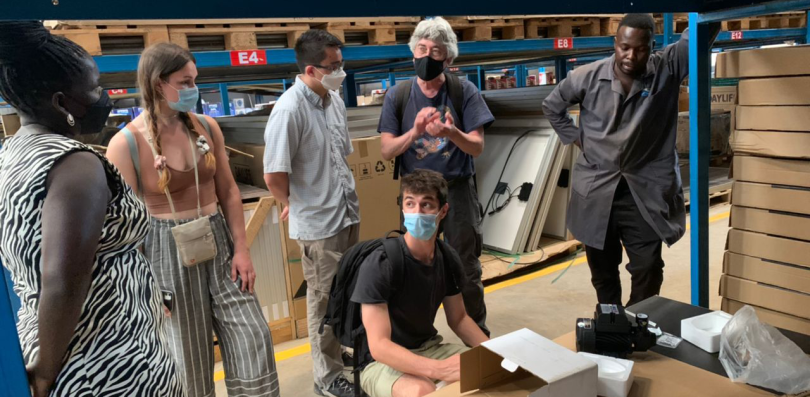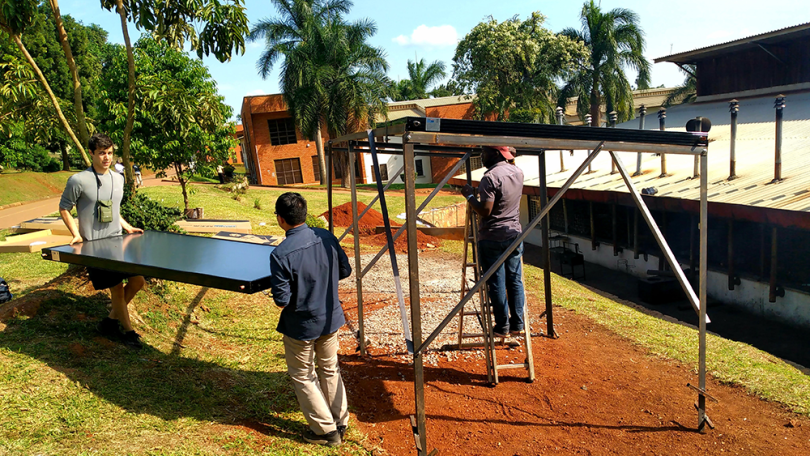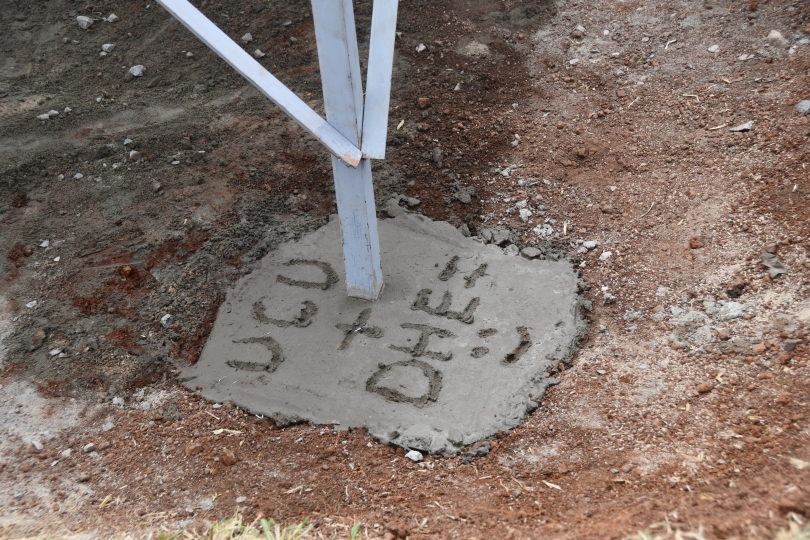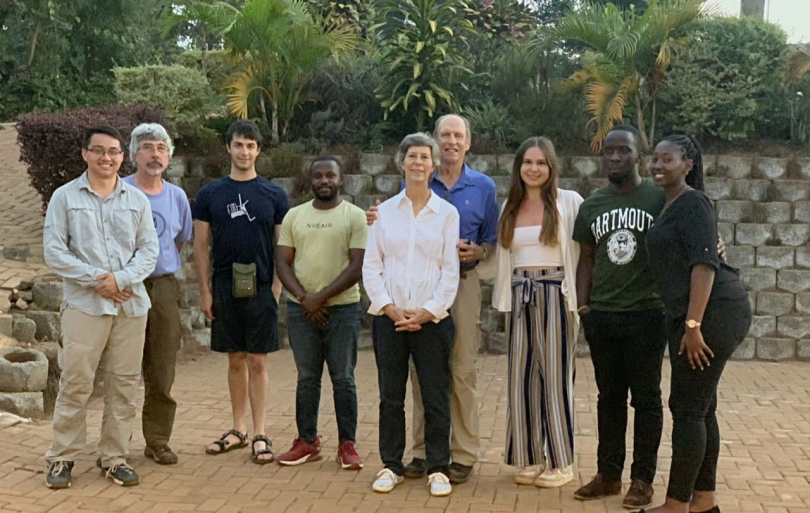
- About
- Education
- Research
- Thought Leadership
- Engagement
- News & Events
Back to Top Nav
Back to Top Nav
Back to Top Nav
Back to Top Nav
Back to Top Nav
Noah Daniel '22 and his fellow Dartmouth Humanitarian Engineers Ethan Aulwes '22 and Veronica Yarovinsky '24 knew they had a solid plan in place to build the solar water heater they designed to help offset firewood usage in cooking in a Ugandan university kitchen. They and other members of the DHelios project, through many hours of planning, trial and error, consultation with advisors, and persistence, managed to build a functional prototype that could heat water to 72 degrees Celsius — even in the sub-zero temperatures of February in New Hampshire. However, the team also knew that an important part of any plan is flexibility: new information, challenges getting supplies, and input from users may result in the need to make adjustments.
And so when the group, accompanied by Irving Institute Senior Advisor Stephen Doig '82, traveled to Mukono, Uganda, home to Uganda Christian University, they knew they'd need to be prepared to adjust their plans and they were excited to find out what the specifics would look like.

One of the biggest surprises for the team was also one of the most rewarding. While Dartmouth and UCU students had been meeting virtually for months to collaborate on the design of the project, meeting on site was a major improvement. "Zoom was terrible!" said Noah. "It was so much easier to share ideas in person." The Dartmouth students worked with a team of seven UCU students who "helped us navigate Kampala [Uganda's capital city, about 25 km from campus], and negotiate prices for supplies we needed. And they were building alongside us – they designed critical components, such as the structure containing the water tank." Noah also appreciated the opportunity to get to know the UCU students outside of an engineering context. "We hung out, grabbed meals… forming those friendships was really nice."
On the technical side of things, Noah said that having the actual users of the system – the cooks who worked in UCU's kitchen to prepare daily meals for the university students – weigh in, was key. "This is human-centered design," said Noah. "We would be actively changing our design based on the feedback we were getting from the cooks. They'd tell us that the one faucet we planned for complicated their process and would make it so they'd have to carry water back and forth across the kitchen. So we added two more faucets attached to flexible metal hosing."

Other factors necessitated changes in the original design, as well. In some cases, certain materials — particularly insulation and copper — were difficult to come by, so the team needed to improvise. Another unanticipated challenge came from local fauna: monkeys! "You have overhanging pipes and you have to reinforce them because you could have a 20-pound monkey swinging and jumping on them!" Termites also complicated plans to use wood in certain elements of the structure.
"It all worked out, though," said Noah, "and we were lucky to be doing this at UCU where there was a lot of local expertise. We worked with the campus electrician and campus plumber…" And as they expanded their connections in the area, sourcing materials became less of a challenge, as well. "At first it took a while to source things, four days to get something we needed," recalls Noah. "But then by the end, we knew who to go to/ask, and we could get something to campus in a couple of hours."
The goal of the project was to implement a system that would enable a reduction in the use of firewood in cooking, creating economic, environmental, and health benefits. In its project overview, the team noted that "While millions of dollars have been spent trying to build a better cookstove, the desire for 100% technology replacement and/or 100% carbon reduction has resulted in a raft of 'solutions' that are either expensive, culturally unacceptable, or are trying to solve a 'problem" that is not relevant.'" The DHElios project "overcomes these challenges by recognizing that solar heated water can meet ~70% of cooking hot water needs in a cost-effective manner and can be adopted into current cooking practices with a simple payback period of nearly three years."
The system, now in operation at UCU, relies on eight solar collectors and a solar-powered circulating pump that heats 500 liters of water to about 70 degrees Celsius, which is stored overnight and used for the next day's cooking. At a recent check in with UCU colleagues, the DHElios team was excited to hear that the system was functioning as planned. The cooks reported that the system saves the kitchen staff time and fuel, and is on track to achieve a reduction of 8.2 metric tons of firewood and 1.2 metric tons of C02 emitted each year.
While the project team was heartened to hear that the prototype was working, they see room to improve the design. Potential refinements include adding a pump controller to decrease heat loss late in the day, devising dust mitigation methods to decrease daily maintenance of the system, and updating system monitoring system software and hardware for better data. Currently, the project team, now led by Anna Hugney '24 (Noah, who graduated in 2022 is still serving as an advisor), Emily Liu '24, Jack McMahon '23, Rujuta Pandit '24, Sofia Ispahani '24, Avery Widen '25, and Jason Dong '24, is looking to return to the UCU campus in summer 2023 to implement some of the aforementioned refinements and double the current system's capacity.

The team's ambition for the DHElios project goes beyond the UCU campus, however. "We ultimately envision the project going to more rural communities that are less funded, maybe like secondary schools that really are going to face issues with the rising price of firewood," Anna said. "And we're also working with an organization led by a Ugandan woman named Jamila Mayanja, who started Girls With Tools, a trade program for women. We're trying to engage them in the process so they can get some of the technical skills necessary to build systems elsewhere."
In addition to refining and expanding the solar heater, the Dartmouth and UCU students are working to make the relationship between the two schools more reciprocal. UCU has a deep expertise in biogas, and so the Dartmouth team is helping train the UCU students to use Arduino, a microprocessor system that allows for remote monitoring that could be helpful in UCU's biogas systems research. The DHElios team members have also been working with Dartmouth Dining and Dartmouth Sustainability to gather and share data from Dartmouth's campus waste systems with UCU students as part of their biogas research, with the possibility of UCU pursuing a project at Dartmouth someday.

The project began with the search for a technical solution to a specific problem — how to use less firewood for cooking in order to reap health, environmental, and financial benefits. And the team is excited by the project's success. But just as the DHelios team knew to expect the unexpected when they traveled to install their system, they have been surprised by another development from the project — new, and ever-deepening relationships. From new connections with the Irving Institute and Richard Ranger '74 (who connected the team with UCU in the first place) to the students, faculty, and staff at UCU, to groups like Girls With Tools, what started as an engineering project is now evolving into new networks, opportunities, and productive professional relationships and friendships.
For more information about the Dartmouth Humanitarian Engineers, visit their website.